Related Research Articles

Looney Tunes is an American animated franchise produced and distributed by Warner Bros. It began as a series of short films that originally ran from 1930 to 1969, along with its spin-off series Merrie Melodies, during the golden age of American animation. Following a revival in the late 1970s, new shorts were released as recently as 2014. The two series introduced a large cast of characters, including Bugs Bunny, Daffy Duck, and Porky Pig. The term Looney Tunes has since been expanded to also refer to the characters themselves.

Isadore "Friz" Freleng, credited as I. Freleng early in his career, was an American animator, cartoonist, director, producer, and composer known for his work at Warner Bros. Cartoons on the Looney Tunes and Merrie Melodies series of cartoons from the 1930s to the early 1960s. In total he created more than 300 cartoons.

Merrie Melodies is an American animated comedy short film series distributed by Warner Bros. Pictures. It was part of the Looney Tunes franchise and featured many of the same characters. It originally ran from August 2, 1931, to September 20, 1969, during the golden age of American animation, though it was revived in 1979, with new shorts sporadically released until June 13, 1997. Originally, Merrie Melodies placed emphasis on one-shot color films in comparison to the black-and-white Looney Tunes films. After Bugs Bunny became the breakout character of Merrie Melodies and Looney Tunes transitioned to color production in the early 1940s, the two series gradually lost their distinctions and shorts were assigned to each series randomly.

Piggy is the name of two animated cartoon characters in the Merrie Melodies series of films distributed by Warner Bros. The first character was a fat, black pig wearing a pair of shorts with two large buttons in the front, and his first film was You Don't Know What You're Doin'!

Foxy is an animated cartoon character featured in the first three animated shorts in the Merrie Melodies series, all distributed by Warner Bros. in 1931. He was the creation of animator Rudolf Ising, who had worked for Walt Disney in the 1920s.
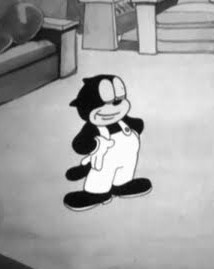
Beans the Cat is an animated cartoon character in the Warner Bros. Cartoons series of cartoons from 1935–1936. Beans was the third Warner Bros cartoon character star after Bosko and Buddy. He was voiced by Billy Bletcher. He was created by director Friz Freleng. The character was featured in nine cartoons made in 1935 and 1936.
Warner Bros. Cartoons, Inc. was an American animation studio, serving as the in-house animation division of Warner Bros. during the Golden Age of American animation. One of the most successful animation studios in American media history, it was primarily responsible for the Looney Tunes and Merrie Melodies series of animated short films. The characters featured in these cartoons, including Bugs Bunny, Daffy Duck, and Porky Pig, are among the most famous and recognizable characters in the world. Many of the creative staff members at the studio, including directors and animators such as Chuck Jones, Friz Freleng, Robert McKimson, Tex Avery, Robert Clampett, Arthur Davis, and Frank Tashlin, are considered major figures in the art and history of traditional animation.
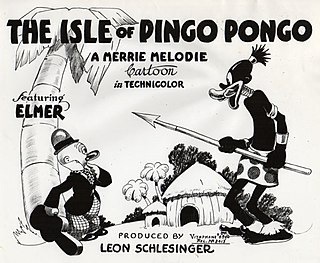
The Isle of Pingo Pongo is a 1938 Merrie Melodies cartoon supervised by Tex Avery. The short was released on May 28, 1938, and features an early version of Elmer Fudd. This is the first of a series of travelogue spoofs, and the first Warner Bros. "spot gag" cartoon, where each vignette is punctuated by a moment of blackout.

Goldilocks and the Jivin' Bears is a 1944 Warner Bros. Merrie Melodies cartoon directed by Friz Freleng and produced by an uncredited Eddie Selzer. The short was released on September 2, 1944.
Hop, Look and Listen is a 1948 Warner Bros. Looney Tunes cartoon directed by Robert McKimson. The short was released on April 17, 1948, and stars Sylvester and Hippety Hopper, in the latter's first appearance.

Farm Frolics is a 1941 Warner Bros. Merrie Melodies cartoon supervised by Bob Clampett. It was released on May 10, 1941.
A Feud There Was is a 1938 Warner Bros. Merrie Melodies cartoon directed by Tex Avery. The short was released on September 24, 1938, and features the fourth appearance of an early version of Elmer Fudd.
This is a listing of all the animated shorts released by Warner Bros. under the Looney Tunes and Merrie Melodies banners between 1940 and 1949.
This is a listing of all the animated shorts released by Warner Bros. under the Looney Tunes and Merrie Melodies banners between 1960 and 1969. A total of 147 shorts were released during the 1960s.

The Fifth-Column Mouse is a 1943 Warner Bros. Merrie Melodies animated cartoon directed by Friz Freleng. The short was released on March 6, 1943.
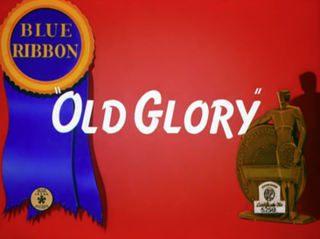
Old Glory is a 1939 Warner Bros. Merrie Melodies animated cartoon directed by Chuck Jones. The short was released on July 1, 1939, and stars Porky Pig. The cartoon was commissioned by Warner Bros. as a counterpart for a series of live-action films about American patriotism.

Flop Goes the Weasel is a 1943 Warner Bros. Merrie Melodies cartoon directed by Chuck Jones. The short was released on March 20, 1943. It's re-released as Blue Ribbon in May 21, 1949.
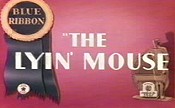
The Lyin' Mouse is a 1937 Warner Bros. Merrie Melodies cartoon directed by Friz Freleng. The short was released on October 16, 1937.
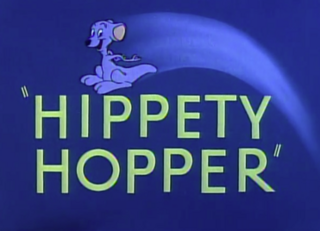
Hippety Hopper is a Warner Bros. Merrie Melodies cartoon directed by Robert McKimson and written by Warren Foster. The short was released on November 19, 1949, and stars Sylvester and Hippety Hopper.
References
- ↑ Beck, Jerry; Friedwald, Will (1989). Looney Tunes and Merrie Melodies: A Complete Illustrated Guide to the Warner Bros. Cartoons. Henry Holt and Co. p. 57. ISBN 0-8050-0894-2.
- ↑ Lenburg, Jeff (1999). The Encyclopedia of Animated Cartoons. Checkmark Books. pp. 104–106. ISBN 0-8160-3831-7 . Retrieved June 6, 2020.
- ↑ YouTube, a Google company. YouTube . Archived from the original on October 16, 2017.